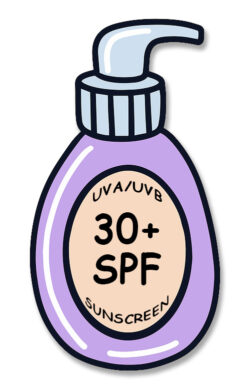I’m sure that by now you’re tired of hearing me say you need a broad-spectrum UVA/UVA sunscreen that’s at least 30 SPF. But what exactly does that mean? Here is a quick guide to explaining the key sunscreen terms and the important factors to keep your skin healthy and looking its best:
Terms:
It can be very confusing with so many products and different terminology used on labeling. Here are the basic terms you need to know:
- Broad-spectrum sunscreen refers to products that protect against both UVA and UVB rays.
- SPF — sun protection factor —indicates how long it would take the sun’s UV rays to burn your skin, as opposed to how long it would take if you weren’t wearing any sunscreen. I recommend SPF of at least 30 if you’ll be spending any time outdoors. Reapply every 2 hours, or immediately after swimming.
- Water-resistant or waterproof — Water-resistant formulas stand up to water better than regular sunscreens but that doesn’t mean they work endlessly if you get wet. Waterproof sunscreens are formulated to last twice as long as water-resistant formulas if you’ve been in the water. In either case, always reapply after getting wet.
Apply and reapply!
Sunscreens only work when you use them, putting them on properly, and often. Apply before you get dressed, then reapply to uncovered areas. Remember to apply around your eyes, the tops of your ears, front and back of your neck, hands, feet, and lips. For sunblock, you can apply and go; with sunscreen, apply 30 minutes before sun exposure. When in the sun, always reapply every 2 hours and after being in the water.
Additional information about sunscreen
Keep your sunscreen out of the heat and direct sunlight. This can be a bit tricky if you’re at the beach, but it’s important to know that improper storage shortens its effective life. Speaking of which, your product will expire. Using expired sunscreen decreases its effectiveness and may even make it as if you’re not using sunscreen at all! Never use it past its expiration date. Nothing showing on the label? When in doubt, throw it out and buy new sunscreen.
Regardless of how long you’ve had your sunscreen, if you notice any change in color or consistency, it’s time to discard it and buy a new one.
Here for you
We provide both medical and cosmetic dermatologic care. Please feel free to contact us to make an appointment.

